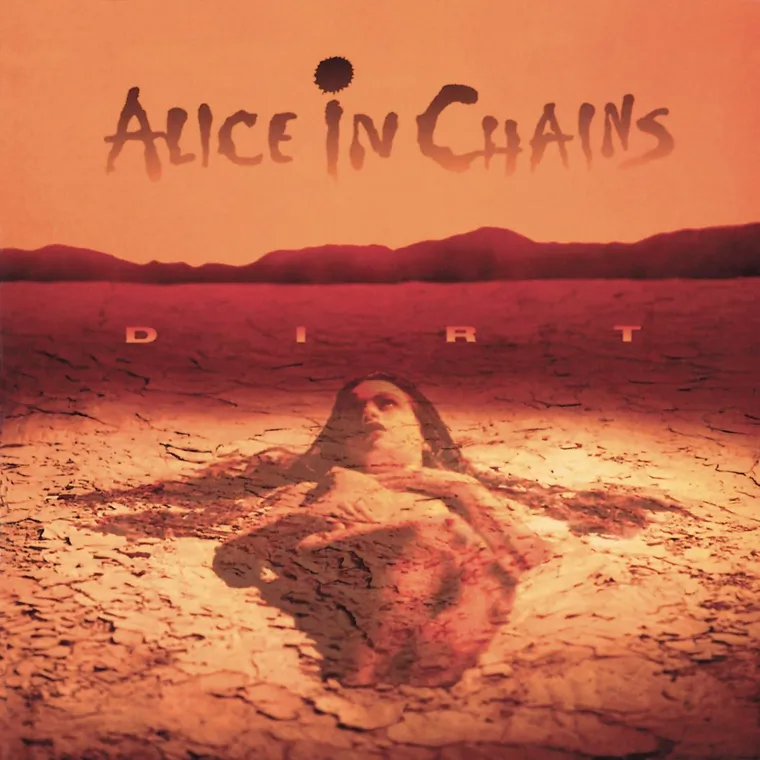Released on September 29, 1992, Dirt wasn’t just another album in the early ’90s alternative scene—it was a dark, emotional gut-punch that solidified Alice in Chains as something deeper than the "grunge" label they were often slapped with. At a time when rock was shifting rapidly, Dirt stood out by leaning into pain instead of rebellion, addiction instead of angst, and raw vulnerability instead of mainstream polish.
This wasn’t a band chasing hits. Dirt feels like the sound of a group fully surrendering to their demons, and making powerful, brutally honest music in the process. It’s ugly, haunting, gorgeous, and completely uncompromising.
A Band Finding Its Voice by Embracing Its Darkness
With Dirt, Alice in Chains didn’t try to sound tougher or more accessible. They embraced what made them different—Layne Staley’s tortured vocals, Jerry Cantrell’s sludgy, layered guitars, and a rhythm section that knew when to be thunderous and when to completely disappear into the shadows.
This album doesn’t feel like a product of its time—it feels like a confession. There's a real sense of catharsis in these tracks, like each one is being pried from a wounded place. While the Seattle scene was full of introspective lyricists, Layne Staley’s voice—both literally and emotionally—cuts deeper than most. He wasn’t just singing about addiction and despair—he was living it.
No Filler, No Mercy: Songs That Define the Record
The album opens with “Them Bones,” and it doesn’t waste a second. A sharp, descending riff kicks in, and Layne howls about mortality like someone who’s looked death in the eye. It’s fast, aggressive, and drenched in dread—a perfect way to set the tone.
“Dam That River” follows with a chugging riff that hits like a wall. It’s less about subtlety and more about raw impact. Jerry Cantrell’s harmonized vocals with Layne are in full force here, and it’s one of those tracks that reminds you how tight this band could be when firing on all cylinders.
Then comes “Down in a Hole,” a slow, crushing ballad that might be one of the most beautiful songs ever written about emotional numbness. The chorus aches. The melody lingers. It’s quiet, but it cuts deeper than the heaviest riff ever could. Cantrell wrote it, but Staley sings it like it was etched into his soul.
And of course, there's “Rooster,” one of the most iconic tracks in the band’s catalog. Written by Cantrell about his father’s experiences in Vietnam, it’s a masterclass in slow-building tension. The way Layne sneaks in with “Ain’t found a way to kill me yet...” is bone-chilling, and the payoff in the chorus is massive—emotional without ever being cheesy.
“Junkhead” is probably the most disturbing song here, mostly because it’s so brutally honest. It doesn’t glamorize addiction, but it doesn’t sugarcoat it either. It's ugly, cynical, and entirely real. Staley's sneering delivery of "What’s my drug of choice? Well, what have you got?" is as raw and unsettling as rock gets.
Beyond the Noise: The Emotional Weight of Dirt
What makes Dirt so unforgettable isn’t just the riffs or the production—it’s the emotional honesty pouring out of every track. It’s an album that refuses to hide from pain.
“Rain When I Die” captures the feeling of quiet despair better than most ballads ever could. The lyrics are cryptic, but the emotion is crystal clear. It's a slow burn, but worth every second.
“Sickman” and “God Smack” lean into chaotic, almost schizophrenic rhythms that reflect the instability behind the lyrics. These songs don’t just talk about mental illness and substance abuse—they sound like them.
And then there’s “Would?”—the closer, and arguably the band’s finest moment. Written in tribute to Mother Love Bone’s Andrew Wood, it balances grief, guilt, and resilience in one of the most compelling rock songs of the ’90s. That slithering bassline, the layered vocals, the cathartic chorus—it’s perfect.
The Band Behind the Bleed: Everyone Pulls Their Weight
While Layne Staley’s voice is the bleeding heart of Dirt, this album wouldn’t be what it is without the full band in sync.
Jerry Cantrell delivers some of the best guitar work of his career here—not just in riffs, but in textures. His ability to layer heavy rhythm with eerie leads gives the album its oppressive atmosphere. He’s also a massively underrated vocalist, and his harmonies with Staley are a defining part of the Alice in Chains sound.
Mike Starr (bass) and Sean Kinney (drums) might not get the same spotlight, but their performances are essential. Starr’s basslines give the songs depth and grit, while Kinney’s drumming is inventive without being flashy. Together, they form the murky undercurrent that gives Dirt its punch.
Sound and Legacy: A Record That Still Hurts in the Right Ways
Dirt is expertly produced by Dave Jerden, who strikes a perfect balance between polish and rawness. The guitars are thick but clear. The drums hit hard but don’t overpower. And most importantly, Layne’s vocals sit right in the emotional center of it all.
In the years since its release, Dirt has aged like a bruised bottle of wine—darker, deeper, and more intense. It’s often cited as one of the greatest rock records of the ’90s, and for good reason. It captured the pain of addiction, the weight of depression, and the power of honest expression without compromise.
Final Verdict: 10/10
Dirt isn’t just a high point in Alice in Chains’ career—it’s a landmark of heavy music as a whole. It doesn’t pander to radio. It doesn’t pretend to be okay. It just lays it all bare and lets you sit with the discomfort, the beauty, and the pain.
If you’re looking for an album that actually feels something—anger, regret, sorrow, defiance—Dirt delivers it in spades. And if you’ve ever been in a dark place yourself, chances are this album knows exactly how you felt.
This is more than grunge. This is survival set to a soundtrack.

